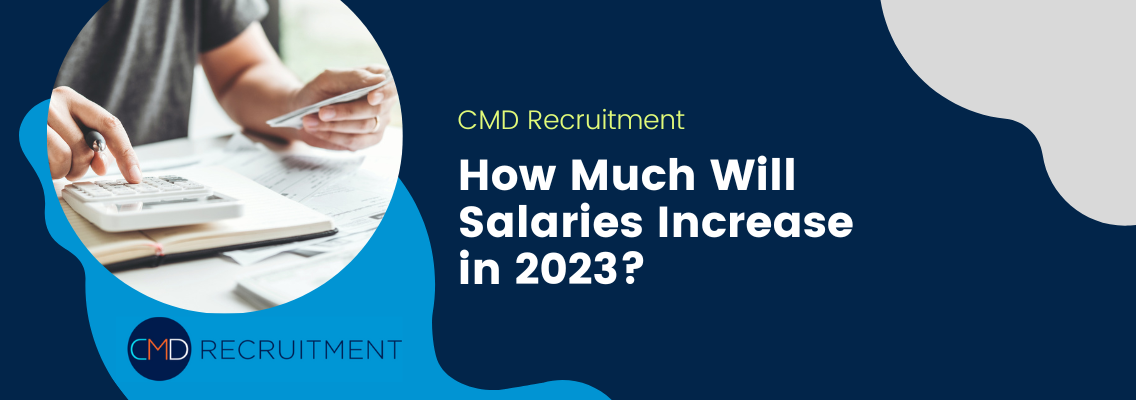Important notice - We are aware of a scam where people are impersonating CMD Recruitment to offer jobs via WhatsApp & Telegram. This is a scam, CMD Recruitment will never contact new candidates via these methods. Any legitmate offer from CMD Recruitment would be made via a telephone call.

May 2, 2023
With inflation at its highest rate since the 1980s, the cost of living is increasing. In response, employees are demanding higher wages to help keep pace with the rise in their household expenses.
Employee strikes indicate that many of these pay increases are long overdue, with some professions having been dealt a pay decrease in recent years. We’ve seen nurses, junior doctors, ambulance workers, postal workers, teachers and rail workers striking in recent months.
The good news for employees is that the vast majority of employers are anticipating pay increases in 2023. But how much can you expect, and what will this mean for the wider economy and working conditions?

According to a recent XpertHR report, 91% of employees are likely to receive a pay rise in 2023. And 89% of these employers state that the rising cost of living is the driving force behind these pay increases.
The majority of these increases could be the result of an increase in the National Minimum Wage, which will compel employers to increase the minimum amount they offer. This is following advice from the low pay commission, which is an independent body that advises the government on the National Minimum Wage.
XpertHR also found that pay is currency at a 32-year high, but it is still trailing behind inflation, which demonstrates just how serious this situation is for the wider economy.

The report suggests that the average increase will be between 3.5% and 6% in the coming quarters. There will be a median pay increase of 5%.
The report also shows that around 85% of employees can expect to receive a higher pay increase than in previous years.
The National Minimum Wage will be increasing by 9.7% from £9.50 to £10.42. These changes came into effect in April 2023. Full time employees should see their annual income increase by £1,600 as a result of these changes.
Workers in the private sector are seeing their salaries increase far more than public sector workers. In many public sector roles, workers are experiencing a real-terms pay cut, and are going on strike to address this issue.
Private sector employers are facing their own challenges, with wage increases now being the norm in order to attract and retain the workers.

The annual growth for private sector wages is currently at 6.9% while public sector workers are trailing behind with an annual growth rate of just 2.7%. This includes bonuses for the same period.
While public sector workers typically enjoy healthy pensions, and this increases the overall liability when pay increases are offered, the private sector is still leading the charge. Public sector workers are right to be angry that their pay increases aren’t in line with private sector workers.

Wage increases drive inflation and inflation drives wage increases, which has prompted the top economists to suggest that workers should accept that they will be worse off. This comment was met with anger by public and private sector workers who are struggling with the cost of living crisis.
Employee salaries are often one of the biggest expenses for businesses, so if their costs increase, they will have to increase the cost of the goods and services they are providing. This feeds into the increased cost of living and helps to fuel inflation.
Another argument is that increased spending power during a time of high inflation can fuel further inflation. If employees are given too much of a pay rise, this can trigger increased demand and this can further increase prices as this impacts supply levels.
The inflation rate is currently at 10.1%, which is well above the Bank of England target of 2%. While the cost of some things looks set to slow down and even decrease in the coming months, this isn’t enough to ease the burden of high prices on households.

Private sector workers are in the best position to request pay increases at this moment in time. Public sector workers are likely to have to wait for the outcome of government pay negotiations with their respective unions.
Job vacancies are currently falling, but they are still higher than they have been for decades. This means that employees have bargaining power when it comes to requesting a pay rise. Employers are concerned that they will lose important staff members if they can’t keep up with pay demands.
Workers who haven’t had a pay increase for a number of years may now be asking for a pay rise in line with inflation. Those who have annual pay reviews may be looking for a higher pay increase than they would usually receive.

No, in the private sector, there are no guarantees that you will receive a pay increase, unless you are currently on the National Minimum Wage. If you are on the minimum wage, your employer is compelled to increase your hourly rate in line with this. If they fail to do so, you can take legal action through HMRC and force them to repay any lost wages.
Private sector workers will be responsible for negotiating their own salary increases. Some companies will have an annual salary review process, while others will wait until employees request a pay rise.
Some companies are offering higher starting salaries to attract new workers, so workers might have to secure an offer from another company in order to take advantage of the current situation. Workers are also using job offers from other companies as bargaining power to secure a healthy pay rise from their current employer.
As mentioned above, there is the risk that offering wages far above the current market value could further fuel inflation. It’s also possible that workers could see the bubble burst, with employers using fire and rehire tactics to bring down wages again once inflation is under control.
Back to Blog